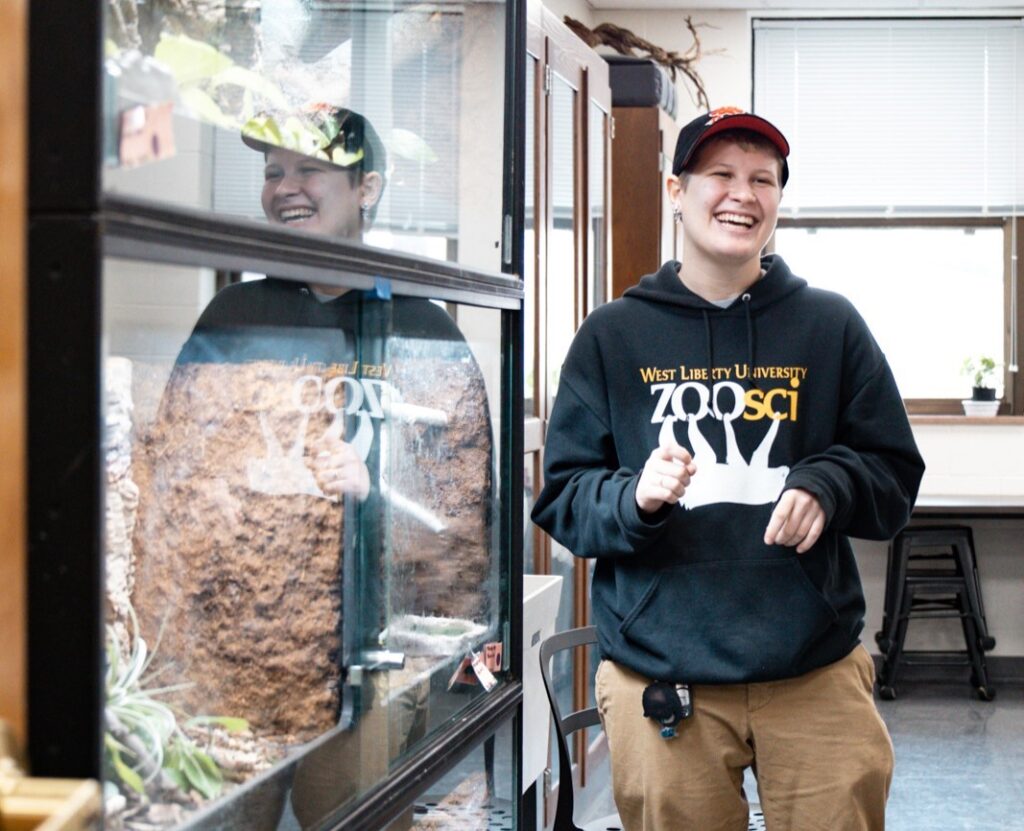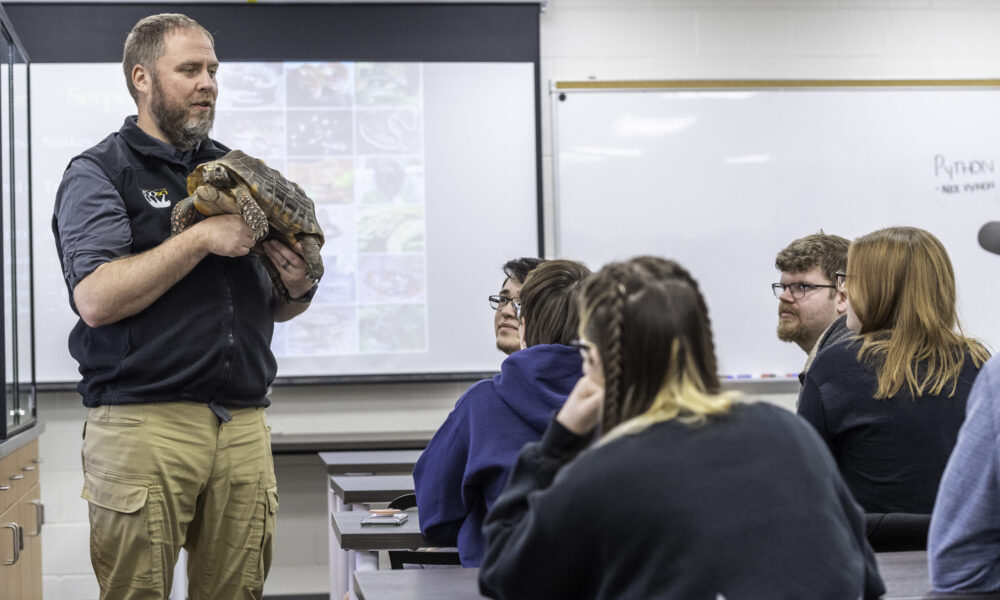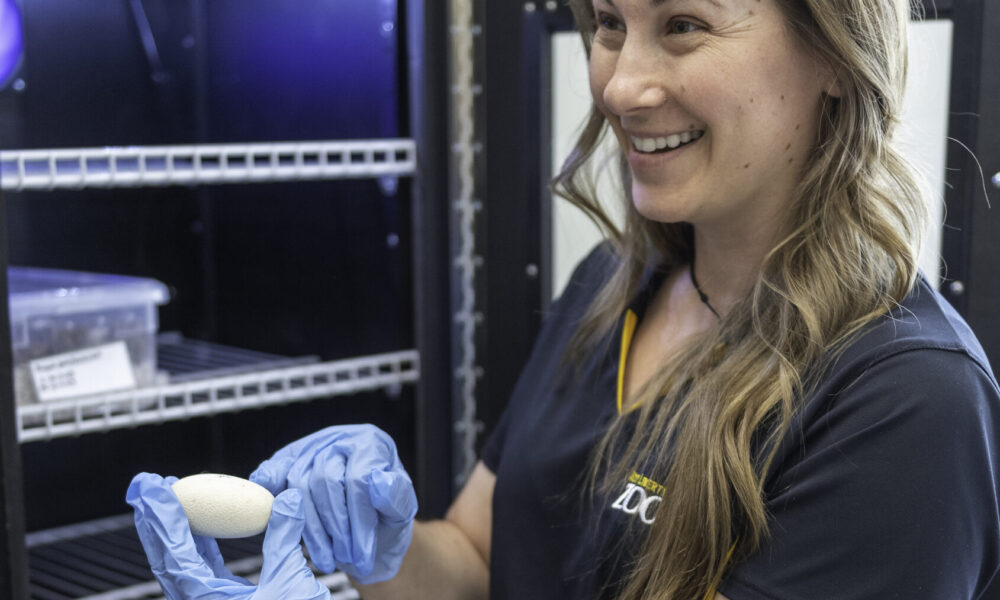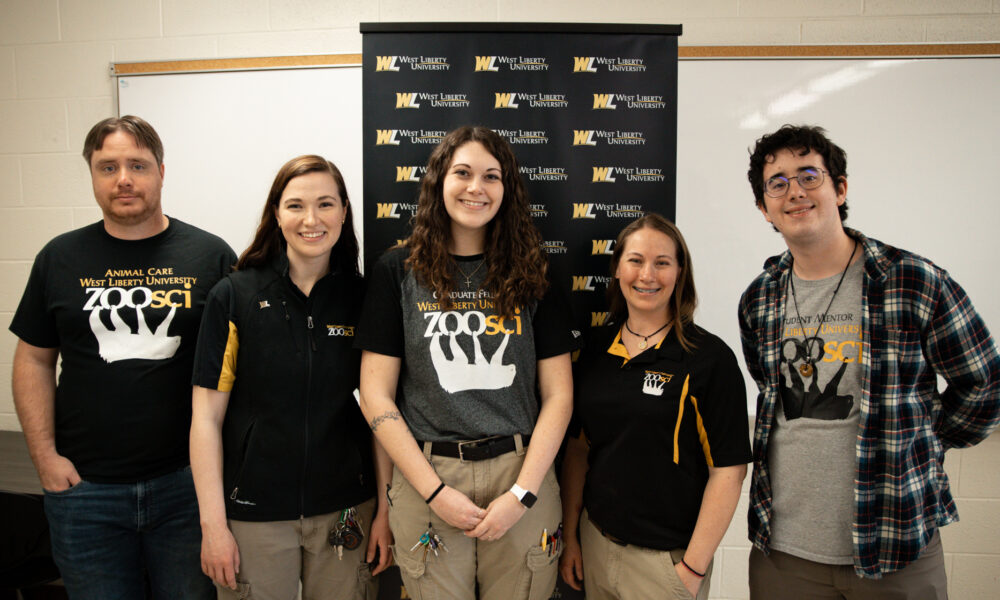
Courses and Curriculum
Zoo Science Undergraduate Program Requirements at WLU:
- Students are admitted to the Zoo Sciences and Applied Conservation major based on a separate application.
- Students must maintain a cumulative GPA of 2.5 in math and science courses
- Students must complete a minimum of 50 hours/semester of animal husbandry with the WLU Zoo Sciences animal collection for a minimum total of 200 hours by the end of the fourth semester of study. See the WLU catalog for more details.
- All students will be admitted as Pre-ZooSci students unless they qualify for accelerated placement with a score of 22 or higher on the Math ACT or equivalent 540 on Math SAT.
For questions regarding the application Zoo Science Undergraduate Program application process, please contact the Office of Admissions at 304-336-8076.
Zoo Science Program Requirements:
- General Electives:
- Any 300-400 level general electives to total 120 hours (approximately 13-18 credit hours; 120 hours required for graduation).
- Courses are not offered every semester/academic year; please consult with your Biology advisor.
- Zoo Science Course Fees: This fee is used to offset costs associated with the care and management of the West Liberty University animal collection, West Liberty University Zoo Science personnel costs, research, permit costs, facility upgrades, and course supplies.
The following courses require a Zoo Science fee of $1,778.00:
- BIO 180 – Principles of Zoo / Aquarium Science
- BIO 280 – Zoo Education
- BIO 380 – Zoo Ornithology Lecture & Lab
- BIO 382 – Zoo Herpetology Lecture & Lab
- BIO 384 – Zoo Mammalogy Lecture & Lab
- BIO 386 – Zoo Applied Conservation
- BIO 450 – Zoo Animal Behavior Management Lecture & Lab
- BIO 452 – Zoo Animal Medicine Lecture & Lab
- BIO 454 – Zoo Internship
- BIO 471 – Conservation Practicum
Freshman & Sophomore Years of Study
- Volunteer Hours: Students must volunteer with the Zoo Science animal collection and applied conservation labs for a minimum of 200 hours per year during the freshman and sophomore years of study as a pre-requisite for experience.
- Summer Internship: A ten-week summer internship between the sophomore and junior year of study at an AZA-accredited zoo is required.
Junior & Senior Years of Study
- Animal Husbandry Focus: Students focusing on animal husbandry must complete two semesters (springs and/or falls) interning at an AZA-accredited facility; suggested semester schedules: 9-12 credit hours of coursework plus 3 credit hours of internship credit for the Zoo experience.
- Applied Conservation Track: Students in the Applied Conservation track must complete two conservation practicums with either applied conservation faculty at WLU or with approved conservation specialists in the field.
- Marine & Aquarium Science Track: Students in the Marine & Aquarium Science track must complete two marine & aquarium internships with either marine & aquarium faculty at WLU or with approved specialists in the field.
Download the Curriculum Sheet.
M.S. in Zoo Science
- Students must complete at least 30 credit hours of biology graduate coursework, including the thesis. A maximum of 9 credit hours may be earned for the thesis.
- Candidates for the Masters of Science degree in Biology (Zoo Science) must successfully complete a grade of “C” or higher, the 19 credit hour Zoo Science core curriculum.
- Students may take up to 9 credit hours of “Independent Study” per semester. However, no more than 2 credit hours in “Independent Study” may be used to complete the 30-hour requirement.
- Successful completion of the graduate program in biology requires a GPA of 3.0 or higher, and no more than 6 credit hours of “C” grades may be applied to the total hours for graduation. Upon completion of course requirements and the thesis, M.S. candidates must pass an oral thesis defense.
Learn more about the M.S. in Biology Zoo Science program
M.A. in Zoo Science
- Students who select the Master of Arts option must complete a designated 30 credit hours of graduate coursework, including the 19 credit hour Zoo Science core curriculum. All credit hours are graded biology graduate courses.
- No more than 6 credit hours of “C” grades may be applied to the total hours for graduation.
- M.A. candidates do not conduct thesis research.
- Successful completion of the M.A. in Biology Zoo Science option requires a GPA of 3.0 or higher and a comprehensive examination score of 75% or higher. Students may take the comprehensive examination a total of two times to achieve or surpass the minimum score.
Learn more about the M.A. in Biology Zoo Science Program

"I chose West Liberty University because of the Zoo Science program. Through it, I get hands-on experience with animals which prepares me for my future career and gives me a good idea of what I’ll be doing for the rest of my life."
Ian Drerup | Austin, TX
Careers
National average salary: $32,767 per year
Primary duties: Zookeepers typically work with a variety of animal species in a caretaking capacity. They may feed animals, clean and groom them, prepare their diets, design their nutritional schedules, observe their behavior, keep records of care and perform maintenance to their exhibits as needed. In addition, zookeepers may offer enrichment activities for animals to ensure they’re receiving the engagement they need to have fulfilling lives.
Read more: Learn About Being a Zookeeper
National average salary: $53,916 per year
Primary duties: Zoo curators are responsible for organizing animal habitats and designing them to ensure all species live in conditions natural to them. They typically work toward maintaining exhibits and supervising the staff, such as zookeepers, veterinarians, educators and volunteers, to reach this overarching goal. In addition, curators may provide specific guidelines for visitors to ensure that they interact with animals in their habitats properly.
Zoologists and wildlife biologists study animals, those both in captivity and in the wild, and how they interact with their ecosystems. Most zoologists and wildlife biologists work full time. Zoologists and wildlife biologists work in a variety of settings, including offices and laboratories. Depending on their job, they also may spend time outdoors, gathering data and studying animals in their natural habitats. Zoologists and wildlife biologists typically need a bachelor’s degree for entry-level positions and may need a master’s degree for higher level jobs. They typically need a Ph.D. to lead research projects.
The median annual wage for zoologists and wildlife biologists was $70,600 in May 2023. Employment of zoologists and wildlife biologists is projected to grow 4 percent from 2023 to 2033, about as fast as the average for all occupations. About 1,500 openings for zoologists and wildlife biologists are projected each year, on average, over the decade. Many of those openings are expected to result from the need to replace workers who transfer to different occupations or exit the labor force, such as to retire.
Source: U.S. Department of Labor, Occupational Outlook Handbook
The Hilltop Advantage

Students are provided opportunities to learn from zoo specialists and conservation biologists to receive hands-on training at partnering Association of Zoos and Aquariums accredited institutions, on-site animal facilities at West Liberty University, as well as in the field.

Experienced and renowned faculty mentor, provide support and encourage students every step of the way. Students also receive biology faculty as advisors to help guide course choices, internship options, and career directions.

At West Liberty University Zoo Science Program, students will ascertain skill sets that prepare them for employment in zoo and conservation facilities, wildlife rehabilitation and restoration, federal and state conservation agencies, and graduate schools in ecological and conservation science.
Beyond the Hilltop Alumni Success Stories
Courtney found her passion with animals, and now she’s the Curator of Education at the Oglebay Good Zoo!
After completing an internship for her degree in Zoo Science and Applied Conservation at West Liberty University, Savanah was hired on fulltime at the National Aviary in Pittsburgh, PA.
Next Steps
Request Info
For more information about West Liberty University, simply fill out and submit the form. Tell us a little bit about yourself, and we’ll send you more information. If you have any additional questions, feel free to contact us.
Visit
The journey of a lifetime starts with your first visit to West Liberty, where you will be greeted by a warm and inviting tree-shaded campus full of excitement.
Apply
Apply today and discover how West Liberty University can help you realize your business career aspirations.


